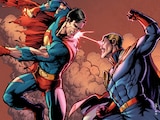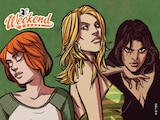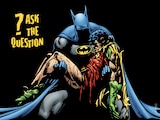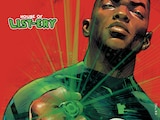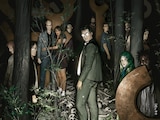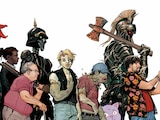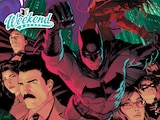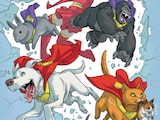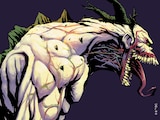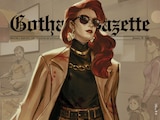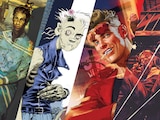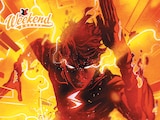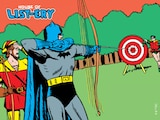Alright, you've watched the first five episodes of Titans on DC Universe. You've met the team, you’ve seen how they come together, and you're figuring out how this new version of a story you're probably pretty familiar with is going to go down. You've also probably noticed that Robin is pretty angry on the show and that might ping you as a little odd. After all, Dick Grayson's most popular reputation (of the many he has, to be sure) is generally not angry. In fact, thinking about Dick Grayson is more likely to bring up the image of a smile and the sound of a snappy pun than it is a scowl or a bloody nose...right?
Well, not always.

In fact, the truth is, Dick Grayson's happy-go-lucky persona actually comes from a relatively small cross section of his history. It's an important part of him, to be sure, but it's not all there is to him. Far from it, in fact.
Peppy, punny Dick has two major root sources. The first is the Golden Age where it's popularly understood that he was introduced as a "counterpoint" to Batman's pervasive angst. This is sort of a misconception. While vintage Robin did have the effect of counterpointing the more adult themes in Batman stories by virtue of being a kid, his actual intent was just to give Bruce someone to talk to while he was doing his detective work. The ’30s and ’40s were a time before comics had really figured out the best way to do narration that wasn’t actual dialogue, which made conveying a story where one man walks around by himself all the time a pretty challenging thing, not only to write, but to read. Bruce needed a companion he could talk to, share ideas with, and more importantly, move the story along through. Robin was made a kid for similar utilitarian means—giving Batman a kid sidekick helped bring in kids as an audience, simple as that.

The goofiness really started to come into play with the dawn of the camp era and Batman '66, with Burt Ward's "Holy (object)!" exclamations and Big! Bang! Pow! color splashes. While Batman in the comics never really merged with Adam West's portrayal, Dick sort of did. By DETECTIVE COMICS #353 in 1966, Robin was using his own "Holy!" puns as he swung around gleefully kicking criminals to the curb.
The camp era eventually gave way, however, and Dick eventually dropped his Burt Ward routine in favor of a much more grounded persona, one that would mesh a bit better with the Gotham envisioned by stories like BATMAN: YEAR ONE and THE DARK KNIGHT RETURNS. The easiest way to see the shift happen in real time is by looking at the stories immediately before CRISIS ON INFINITE EARTHS and immediately after. Dick Grayson's transition from Robin to Nightwing was occurring right around that time and, just sampling how his pre-Crisis self handled being replaced by Jason Todd (check out BATMAN #368 for that) versus his post-Crisis self reliving that moment (in BATMAN #416) is enough to set the tone for Dick's emotional outlook for the vast majority of the modern era. Spoiler alert: Modern Dick was pretty upset with just how things had gone down.

Of course, he didn't stay angry. Dick and Bruce repaired their relationship eventually after Jason died and Tim Drake entered the scene, but, like in any relationship, they went through their fair share of rough patches, and Dick went through some rough patches with his other teams as well. One of the biggest foundational elements of his modern personality was a constant tug-of-war between the optimism he wanted to represent and the bleak pragmatism Batman had instilled in him growing up.
As a team leader in his adult life, Dick often found himself forced into the role of the secretive loaner, the tactician, and the disciplinarian. When he tried pivot to the opposite end of the spectrum and lighten up, his friends tended to get hurt. During his tenure with the Outsiders, Dick explicitly forbid himself from forming personal relationships with the team, trying to protect them (and himself) from the potential disasters that come with getting too emotionally invested in your extremely dangerous line of work.

Dick's time with the Outsiders epitomized his particular brand of anger, the kind he learned to hone into an ice cold professionalism from his time in Gotham, the kind he hoped would protect not only himself, but his friends in the process. The kind that didn't always work out for him the way he wanted or planned.
For more examples of Dick spiraling closer to the grim and Bat-like end of the spectrum, check out stories like NIGHTWING: MOBBED UP, BRUCE WAYNE: MURDERER? and OUTSIDERS/CHECKMATE: CHECKOUT. Optimism and warmth are important, to be sure. But let's not forget that the first Robin is, and always has been, his father's son.
Catch new episodes of Titans every Friday on DC Universe. Click here to subscribe now.

